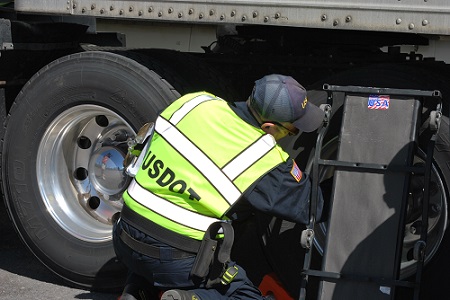4 Tips for Working with Enforcement Agencies to Improve Your Safety and Bypass Rates
Steve Vaughn, National Director of Field Operations at HELP Inc., the provider of PrePass weigh station bypass services.
Whether you’re a fleet executive, safety director, company driver or an owner-operator, if your safety scores aren’t strong enough, you’re probably not getting bypass green lights as often as you wish. But there’s a way to take safety scores into your own hands: tap into the expertise of law enforcement.
Commercial vehicle enforcement agencies, especially at the state level, say they are often readily available to help trucking operations improve their level of safety, with real-world advice from the men and women who enforce the rules and regulations every day.
Here are four proactive ways truck fleets and owner-operators can work with enforcement officers to find out how to improve safety.
1. Join State Trucking Associations and Attend Events
Every state has a trucking or motor carrier association. And most, if not all, have at least one or two major events each year. In many cases, these events focus on truck and driver safety.
Greg Kindle, a former major with the Missouri State Highway Patrol, said his agency frequently sent officers to events hosted by the Missouri Trucking Association. He’s now a regional director for HELP Inc., the non-profit provider of PrePass, overseeing PrePass operations in Illinois, Indiana, Michigan, Mississippi, Tennessee and Wisconsin.
"We made ourselves available to the trucking industry if they had questions about what they needed to do that could improve their fleet safety," Kindle said.
According to HELP Inc. Regional Director Jennifer Brown, who spent more than a decade as a lieutenant with the Arizona Department of Transportation’s Enforcement and Compliance Division, this can also include attending state truck driving championships and fleet safety awards.
At such events, Brown said, enforcement agencies will often explain to participating companies what enforcement officers are looking for during truck inspections.
"I think this is a big benefit for carriers, because everybody is on the same page with those communication lines. Ultimately, safety is everyone’s number one priority."
2. Ask for Truck Inspections
According to Lt. Tracy Barker, an enforcement officer with the Motor Vehicle Division of the Iowa Department of Transportation, it’s not uncommon for drivers to come into a scale house and ask for a truck inspection.
If invited, some law enforcement agencies will pay a visit to your fleet and perform inspections. If problems are found, they can tell a fleet what’s wrong without a penalty. While this won’t improve a fleet’s Inspection Selection System (ISS) score, which is used to determine whether or not a truck gets a bypass at a weigh station or highway inspection site, it can help you develop a plan of action so you can better inspection results in the future.
"Officers look at how the carriers are operating, how they’re running their log books, how much their people are working, and basically break down their whole system and guide them," said Lt. Barker. "If we find something they’re doing wrong, we don’t write tickets. Rather, we guide them to help improve their business model so they are doing things that are accurate and consistent."
3. Take Advantage of Outreach Programs
Barker said fleets can ask about free outreach programs from law enforcement.
"If you’re a carrier you can call up and say, for instance, ‘Hey, we want a load securement program. Can you guys come in and from an enforcement officer’s perspective, go through load securement, deliver an instruction message to the drivers and other members of the carrier so that we know exactly what you’re looking for?’ This can be done at no cost to the carrier," he said.
Kindle said enforcement officers can address many issues when meeting with trucking companies and drivers. Sessions can cover topics such as being more aware of four-wheelers and moving around them, brake adjustments, pre-trip inspections, and hours of service, just to name a few.
4. Use Data to Begin Discussions
Fleets can also use safety data from inspections as a point to begin discussions with law enforcement regarding items that are getting their attention during inspections of the carrier’s trucks.
This data can come from what is recorded in the Federal Motor Carrier Safety Administration’s Safety and Fitness Electronic Records (SAFER) System, or what they can access free of charge as a PrePass customer in the InfoRM Safety Data system
PrePass InfoRM. InfoRM provides PrePass carriers with information about their ISS scores that impact bypass rates.
According to Brown, InfoRM is, "a very good tool for a carrier to monitor its fleet and drivers on their journeys and can aid in communicating with law enforcement and working together to improve those safety scores."
The ultimate goal of any of these steps is to prevent safety issues at the terminal and take care of them before the truck leaves the premises. Said Kindle: "It’s a lot better than handling it out on the road."
CTA is here to help you! To get your regulatory and compliance questions answered, please call the CTA Help Desk at (916) 373-3500 or email us at helpdesk@caltrux.org. A representative is available to speak with you Monday through Friday, 8:30 a.m. to 5:00 p.m.
Article provided by HELP, Inc. CTA’s Executive Circle Club Partner.
The views expressed in this article reflect the views of the author and do not necessarily reflect the views of the California Trucking Association.

